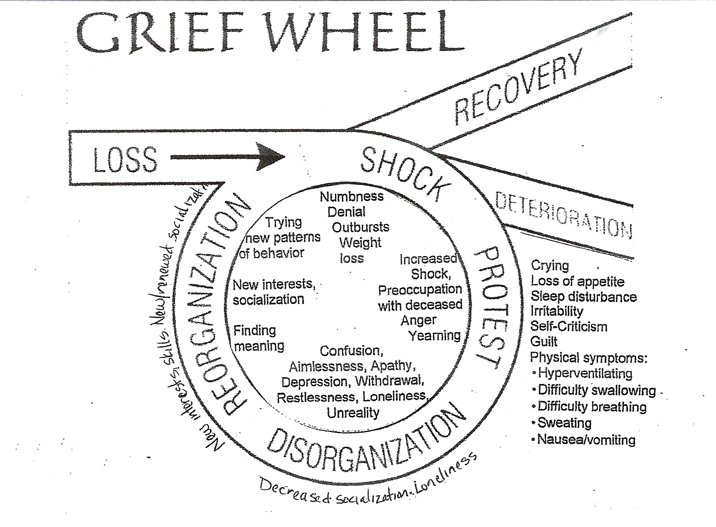“The soul would have no rainbow if the eyes had no tears.”
WORKSHEETS AND RESOURCES:
COPING WITH GRIEF Source: Helpguide.org Grief can be brought on by many life experiences. Divorce or relationship breakup Loss of health Losing a job Loss of financial stability A miscarriage Death of a pet Grief from the past can also be reawakened by a new event, our own or that of someone close to us. Loss of a cherished dream A loved one’s serious illness Loss of a friendship Loss of safety after a trauma Selling the family home Retirement MYTHS AND FACTS ABOUT GRIEF Source: Center for Grief and Healing MYTH: The pain will go away faster if you ignore it. Fact: Trying to ignore your pain or keep it from surfacing will only make it worse in the long run. For real healing it is necessary to face your grief and actively deal with it. MYTH: It’s important to be “be strong” in the face of loss. Fact: Feeling sad, frightened, or lonely is a normal reaction to loss. Crying doesn’t mean you are weak. You don’t need to “protect” your family or friends by putting on a brave front. Showing your true feelings can help them and you. MYTH: If you don’t cry, it means you aren’t sorry about the loss. Fact: Crying is a normal response to sadness, but it’s not the only one. Those who don’t cry may feel the pain just as deeply as others. They may simply have other ways of showing it. MYTH: Grief should last about a year. Fact: There is no right or wrong time frame for grieving. How long it takes can differ from person to person. THE FIVE STAGES OF GRIEF Source: Elisabeth Kübler-Ross Denial: “This can’t be happening to me.” Anger: “Why is this happening? Who is to blame?” Bargaining: “Make this not happen, and in return I will ____.” Depression: “I’m too sad to do anything.” Acceptance: “I’m at peace with what happened.” You do not have to go through each stage in order to heal, and you do not necessarily go through the stages in order or only once. COMMON SYMPTOMS OF GRIEF Shock and disbelief or “Magical thinking” Sadness – emptiness, despair, yearning, or deep loneliness. You may also cry a lot or feel emotionally unstable. Guilt Anger – with yourself, God, the doctors, or even the person who died for abandoning you. Fear, anxiety, helplessness, or insecurity. You may even have panic attacks. Physical symptoms –fatigue, nausea, lowered immunity, weight loss or weight gain, aches and pains, and insomnia. “There is not a typical response to loss, as there is no typical loss.” (Elisabeth Kubler-Ross) Sleeplessness, loss of appetite, difficulty concentrating, and frequent changes of mood are common. Children often display irritability when depressed, confused or sad. Almost anything that you experience in the early stages of grief is normal—including feeling like you’re going crazy, feeling like you’re in a bad dream, or questioning your religious beliefs. GRIEF COPING TIPS Source: Helpguide.org Tip #1: Get Support. Don’t grieve alone. Connecting to others will help you heal. Turn to friends and family members —whether it’s a shoulder to cry on or help with funeral arrangements. Draw comfort from your faith Join a support group –contact local hospitals, hospices, funeral homes, and counseling centers. Talk to a therapist or grief counselor Tip #2: Take Care of yourself. Face your feelings. Express your feelings in a tangible or creative way. Look after your physical health. Don’t let anyone tell you how to feel, and don’t tell yourself how to feel either. It’s okay to be angry, to yell at the heavens, to cry or not to cry. It’s also okay to laugh, to find moments of joy, and to let go when you’re ready. Plan ahead for grief “triggers.” Anniversaries, holidays, and milestones can reawaken memories and feelings. Be prepared for an emotional wallop, and know that it’s completely normal WHEN GRIEF DOESN’T GO AWAY Complicated grief:. If the pain of the loss is so constant and severe that it keeps you from resuming your life, you may be suffering from a condition known as complicated grief . Complicated grief is like being stuck in an intense state of mourning. You may have trouble accepting the death long after it has occurred or be so preoccupied with the person who died that it disrupts your daily routine and undermines your other relationships. Symptoms of complicated grief include: Intense longing and yearning for the deceased Intrusive thoughts or images of your loved one Denial of the death or sense of disbelief Imagining that your loved one is alive Searching for the person in familiar places Avoiding things that remind you of your loved one Extreme anger or bitterness over the loss Feeling that life is empty or meaningless The difference between grief and depression: Remember, grief can be a roller coaster. It involves a wide variety of emotions and a mix of good and bad days. Even when you’re in the middle of the grieving process, you will have moments of pleasure or happiness. With depression, on the other hand, the feelings of emptiness and despair are constant. Other symptoms that suggest depression, not just grief: Intense, pervasive sense of guilt Thoughts of suicide or a preoccupation with dying Feelings of hopelessness or worthlessness Slow speech and body movements Inability to function at work, home, and/or school Seeing or hearing things that aren’t there Grief wheel taken from gbcmpk.org
Coping With Grief
Supporting Others After A Loss Due to Suicide
ONLINE ARTICLES AND VIDEOS:
The four stories we tell ourselves about death (Stephen Cave, Ted Talk)
"How to Be a Friend in Deed" (New York Times / Bruce Feiler)
Magic Valley Bereavement Coalition
BOOK RECOMMENDATIONS:
For Adults:
When Bad Things Happen to Good People (Harold Kushner)
The Lord Is My Shepherd (Harold Kushner)
For Children:
For children and teens: In the grief process it is not uncommon for the needs of children and teens to be overlooked or misunderstood. Visit Because Kids Grieve
I'll Always Love You (Hans Wilhelm)
The Heart and the Bottle (Oliver Jeffers)

